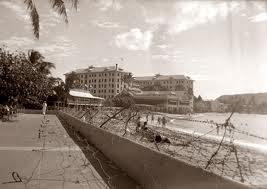TWO O’CLOCK, EASTERN WARTIME
John Dunning
Jack Dulaney, who was deaf in one ear and so was not eligible for the draft was making living walking horses at racetracks on the west coast during the early years of the war. Bur after Pearl Harbor the government were shutting down the racing and were using the stables at the race tracks as internment camps for the American Japanese citizens who lived on the west coast.
 Jack was write who had published a novel but it was no enough of a moneymaker to bring bread to the table. He had come to the west coast to try to forget about the girl he loved Holly Carnahan. She was the girl friend of his best friend Tom and although he knew that Holly had had feelings for him as well he could not be a part of what would happen so he left. Sadly, Tom was now dead at Pearl Harbor now too.
Jack was write who had published a novel but it was no enough of a moneymaker to bring bread to the table. He had come to the west coast to try to forget about the girl he loved Holly Carnahan. She was the girl friend of his best friend Tom and although he knew that Holly had had feelings for him as well he could not be a part of what would happen so he left. Sadly, Tom was now dead at Pearl Harbor now too.Jack, then gets into a bar fight and ends up in Jail, but get a SOS letter from Holly so escapes from a chain gang and heads east. He ends up on the Jersey shore where there is an extraordinary radio station WHAR. These are the days prior to practical television when many thought that the TV images were just a fad and that nothing would come of them. But Jack had found a home. He changed his name to Jordan Ten Eyck and became someone new.
 There was strict government control of the airwaves at the time and much of went on the air was censored and watered down but still many felt that Radio was a great medium and that the great days of radio were yet to come. The feeling was that much more could be done on radio than ever could be done on TV. Daily shows of great drama and music were possible if only ideas like controversial subjects of race, government controls, sex, incest and the like could be covered. The more things change the more things stay the same.
There was strict government control of the airwaves at the time and much of went on the air was censored and watered down but still many felt that Radio was a great medium and that the great days of radio were yet to come. The feeling was that much more could be done on radio than ever could be done on TV. Daily shows of great drama and music were possible if only ideas like controversial subjects of race, government controls, sex, incest and the like could be covered. The more things change the more things stay the same.There were the same types of arguments of what types of music could the American public understand, or even what kind of music should they be allowed to hear. Live radio, what an exciting time it was. Jack was in his element because he had found his métier! His words flowed like water. His scripts were gems.
Behind the scenes however were the usual turbulent times of German spies, murdered and lost loves, twisted pasts that have been hidden all roiling just beneath the surface just like the radio soaps. Holly Carnahan is here under a different name; there are buried bodies, barbed wire on the beach, dead bodies washing up on the shore from downed submarines. The one flaw I saw was that Jack spoke as if he knew in whose favor the war would be resolved.
These days you can listen to some of the shows available in the forties on satellite radio on stations called Classic Radio. Here again the shows are the ones that stood the test of time and progressed on to television. There seems to be a preponderance of half hour comedies and detective dramas and what strikes me are the tones of the women's voices. What was popular for the female chanteuse as well as the female house wife type is one not heard often today. Main male characters voices seem a little higher as well in register. This was considered less threatening perhaps.
I was not there but it is sad to think that those lofty dreams never came to pass.
These days you can listen to some of the shows available in the forties on satellite radio on stations called Classic Radio. Here again the shows are the ones that stood the test of time and progressed on to television. There seems to be a preponderance of half hour comedies and detective dramas and what strikes me are the tones of the women's voices. What was popular for the female chanteuse as well as the female house wife type is one not heard often today. Main male characters voices seem a little higher as well in register. This was considered less threatening perhaps.
I was not there but it is sad to think that those lofty dreams never came to pass.



No comments:
Post a Comment